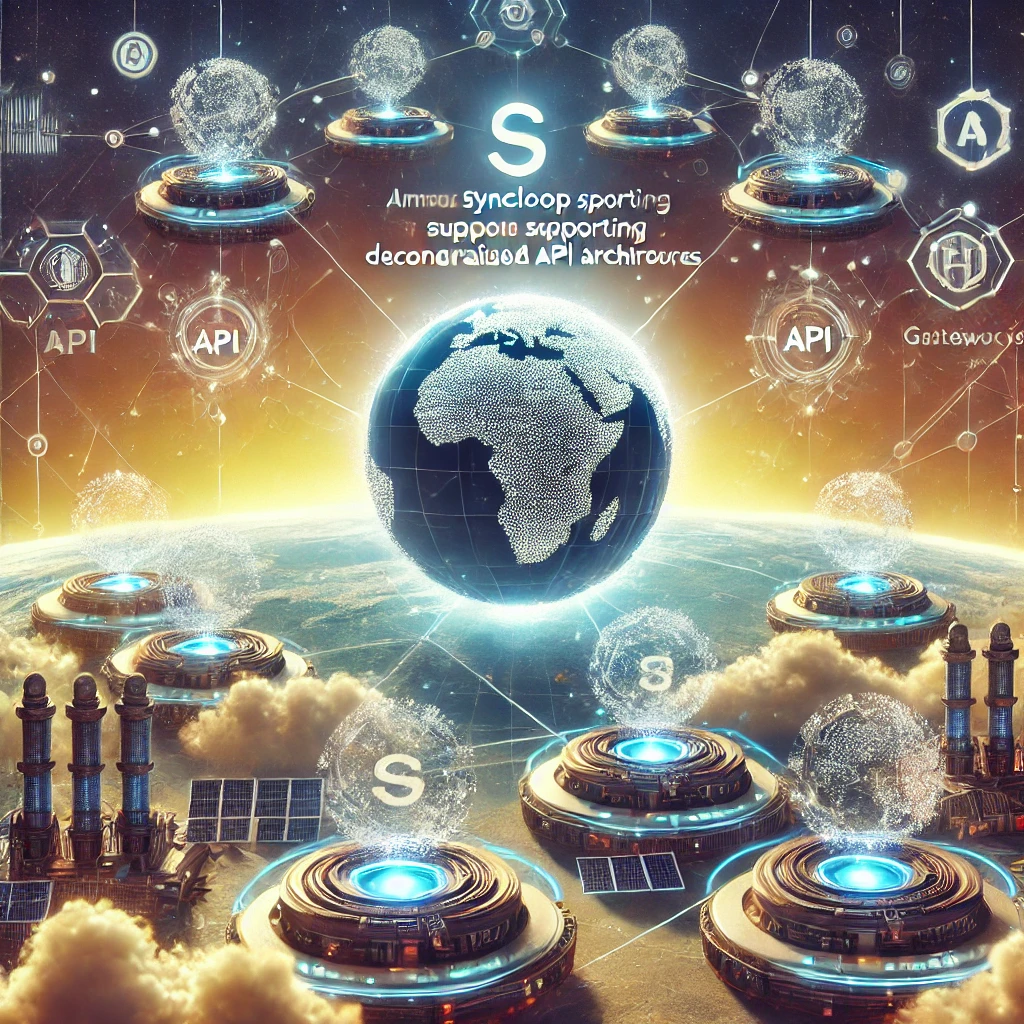How Syncloop Supports Decentralized API Architectures

This blog explores how Syncloop empowers developers to build and manage decentralized API architectures, offering the flexibility and scalability needed for modern applications.
What is a Decentralized API Architecture?
Decentralized API architectures distribute API functionalities across multiple independent services or nodes rather than relying on a single centralized system. Key characteristics include:
- Autonomy: APIs operate independently without reliance on a central server.
- Scalability: Each service can scale individually based on demand.
- Resilience: Failure in one part of the system does not affect the entire architecture.
- Flexibility: Easily integrates with diverse systems and platforms.
Benefits of Decentralized API Architectures
- Improved Resilience: Reduces the impact of failures by distributing responsibilities.
- Scalability: Handles growing workloads by scaling individual components.
- Enhanced Performance: Reduces latency by processing requests closer to the source.
- Flexibility: Adapts to evolving business needs with modular services.
- Reduced Bottlenecks: Eliminates reliance on a single point of failure or congestion.
How Syncloop Supports Decentralized API Architectures
1. Dynamic Load Balancing
Syncloop provides load-balancing capabilities to distribute traffic across multiple API nodes.
- Features:
- Intelligent request routing based on load and availability.
- Dynamic adjustments to traffic patterns.
- Benefits:
- Optimizes resource utilization across distributed services.
- Ensures high availability and performance.
- Use Case: Balancing API requests across multiple microservices in a retail application.
2. Service Discovery
Syncloop enables seamless discovery of services in a decentralized architecture, simplifying integration.
- Features:
- Registry for tracking active API endpoints.
- Automated updates when services are added or removed.
- Benefits:
- Reduces manual configuration efforts.
- Enhances reliability by ensuring up-to-date service information.
- Use Case: Dynamically locating APIs in a distributed IoT ecosystem.
3. Event-Driven Communication
Syncloop supports event-driven architectures, allowing decentralized APIs to communicate efficiently.
- Features:
- Integration with message brokers like Kafka or RabbitMQ.
- Support for WebSocket and Server-Sent Events (SSE).
- Benefits:
- Enables real-time interactions between APIs.
- Reduces dependency on synchronous communication.
- Use Case: Synchronizing inventory updates across decentralized warehouse systems.
4. Granular Security Controls
Syncloop enforces robust security measures to protect decentralized APIs from unauthorized access.
- Features:
- Role-based access control (RBAC) for API permissions.
- End-to-end encryption for secure communication.
- Benefits:
- Safeguards sensitive data in distributed environments.
- Ensures compliance with security standards.
- Use Case: Securing payment APIs in a decentralized financial system.
5. Edge Computing Support
Syncloop integrates seamlessly with edge computing platforms, enabling APIs to operate closer to data sources.
- Features:
- Deployment support for edge nodes.
- Low-latency communication between edge and central systems.
- Benefits:
- Reduces latency for real-time applications.
- Enhances performance by processing data locally.
- Use Case: Running APIs on edge devices for real-time analytics in a smart city project.
6. API Orchestration
Syncloop allows developers to orchestrate workflows across decentralized APIs, ensuring smooth coordination.
- Features:
- Conditional logic for API workflows.
- Event triggers to automate multi-step processes.
- Benefits:
- Simplifies complex workflows across distributed services.
- Enhances efficiency and reduces manual intervention.
- Use Case: Coordinating user authentication across multiple decentralized APIs.
7. Monitoring and Analytics
Syncloop provides tools to monitor the health and performance of decentralized APIs.
- Features:
- Dashboards for real-time metrics like latency, error rates, and traffic patterns.
- Alerts for anomalies or failures.
- Benefits:
- Enhances reliability through proactive issue detection.
- Provides insights to optimize distributed architectures.
- Use Case: Tracking performance metrics for decentralized APIs in a logistics network.
Real-World Applications of Decentralized APIs with Syncloop
1. E-Commerce
- Use Case: Decentralizing inventory and order management APIs across regional warehouses.
- Benefit: Improves system resilience and reduces latency for local users.
2. IoT Systems
- Use Case: Deploying APIs on edge devices for real-time data processing and control.
- Benefit: Enhances responsiveness and reduces bandwidth costs.
3. Financial Services
- Use Case: Distributing transaction processing APIs across multiple nodes to improve fault tolerance.
- Benefit: Ensures high availability and security for critical operations.
4. Media and Entertainment
- Use Case: Streaming APIs for delivering content from geographically distributed servers.
- Benefit: Reduces buffering and enhances user experience.
5. Healthcare
- Use Case: Decentralizing APIs for patient data access across hospital networks.
- Benefit: Ensures data availability and compliance with privacy regulations.
Best Practices for Decentralized API Architectures with Syncloop
- Optimize Communication: Use event-driven or asynchronous communication to minimize latency.
- Implement Security Standards: Leverage Syncloop’s encryption and RBAC features to protect APIs.
- Monitor Continuously: Use real-time monitoring tools to track and optimize API performance.
- Enable Scalability: Configure auto-scaling to handle growing workloads efficiently.
- Plan for Fault Tolerance: Design APIs to operate independently and recover gracefully from failures.
The Future of Decentralized APIs with Syncloop
As decentralized architectures become more prevalent, Syncloop is advancing its platform with:
- AI-Driven Insights: Predictive analytics for optimizing API performance and resilience.
- Enhanced Edge Support: Deeper integrations with edge computing technologies.
- Distributed Security Models: Advanced tools for protecting APIs in decentralized environments.
These innovations will further simplify the development and management of decentralized APIs, empowering businesses to innovate at scale.
Conclusion
Decentralized API architectures offer unmatched scalability, resilience, and flexibility for modern applications. Syncloop provides the tools and infrastructure to build and manage these architectures effectively, enabling developers to focus on delivering value to their users.
By leveraging Syncloop, businesses can embrace decentralized architectures with confidence, ensuring their APIs are future-ready and capable of meeting evolving demands.
A diagram illustrating Syncloop’s role in supporting decentralized API architectures, showcasing dynamic scaling, edge computing, and secure communication.
Back to Blogs